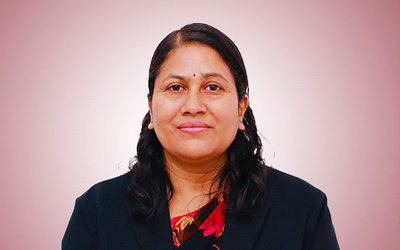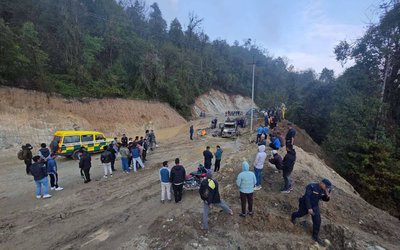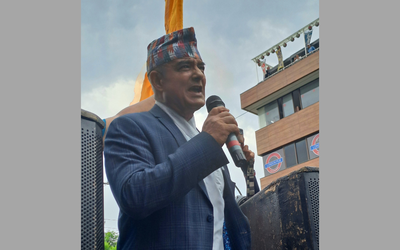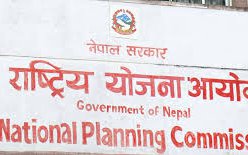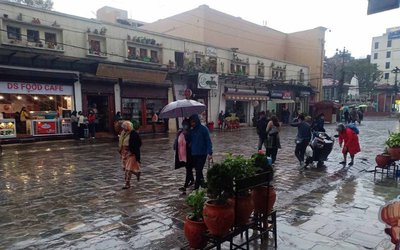
Various speakers stressed the need to increase connectivity in the region to achieve highest economic growth. Organized by the French Embassy, Alliance Française de Katmandu, and Nepal Economic Forum speakers expressed the views in a talk program titled “Linkfest talk on Economic Development in Landlocked Countries Part 2” earlier.
This talk program is a follow up to the “Night of Ideas” debate program held in January 2017 which focused more on the policy aspects.
The objective of the talk program was to make a shift from vision to actions and explore how the issue of land linked could, in fact, be beneficial.
The panelists of talk program included Bipul Chatterjee, Executive Director of CUTS International, Centre for International Trade, Economics & Environment (India), Francois Driard CEO of Himalayan French Cheese (Nepal), Kulman Ghising, Managing Director of Nepal Electricity Authority (Nepal), Minh Pham, former UN resident coordinator and Rensje Teerink, Ambassador of the European Union Delegation to Nepal (Nepal).
Moderated by the chairperson of Nepal Economic Forum, Sujiv Shakya, Panelists have expressed their views. Opening the program, Minh Pham stressed that by 2025 Nepal will be neighbors with the largest economy in the world, China and by 2050, with the second largest economy, India.
“Therefore, Nepal should leverage on this situation and reap maximum benefits. To do so, he laid out two main strategies for Nepal. Firstly, Nepal needs to change its mentality and consider its relationship with the two giant economic powers a positive sum game rather than a zero sum game. Secondly, Nepal should develop their economic and political diplomacy if they are to gain maximum benefits from their neighbors and also focus on “infrastructure diplomacy”.
Highlighting the talk program, Kulman Ghising, MD NEA, emphasized the importance of regional connectivity for Nepal and its potential to bring about immense benefits for Nepal’s economy. He underscored that since China is geographically very close to Nepal, Nepal has the potential to export energy through high transmission lines. Additionally, he thinks market integration and a stable energy banking structure are critical to enabling the energy sector to reach its maximum potential.
Bipul Chatterji mentioned that for any initiative to work Consultation, Consensus and Collaboration are three keys. In this regard, he talked about the Bangladesh, Bhutan, India, Nepal (BBIN) initiative and stressed that cooperation between countries is essential in moving forward. He further gave the Great Mekong Sub-region (GMS), an initiative by ADB in the South East Asian Region, as a model to work on for the South Asian region.
Francois Driard provided his experience as an entrepreneur in Nepal and emphasized on the need for a wider market for Nepali entrepreneurs. He highlighted that a major hurdle for entrepreneurs is the simplification of exporting process to reach international standards which require working closely with the government.Ambassador Rensje Teerink provided EU as a model of regional connectivity. She further stressed that regional connectivity cannot be determined by political differences and requires political will of nations to come together and integrate. Moreover, she highlighted that while there are many initiatives for connectivity in the South Asian region, political will is of paramount importance.
Attended by the members of the diplomatic corps, senior officers from the Government of Nepal, researchers, students, and representatives of media, Yves Carmona Ambassador of France, gave the closing remarks at the occasion.
As part of the LinkFest, a talk program at the Kathmandu University School of Management was also organized to the students of the Masters level. About the “LinkFest”: LinkFest is conceived as a platform to bring in people who believe in the concept of linkage, rather than isolation, to ideate on what can be done to connect in a better way.
- FORMER KING GYANENDRA: Bating Constituional Monarchy
- Apr 28, 2025
- NC-UML COALITION: In Turmoil
- Apr 27, 2025
- TEACHERS ON STRIKE: Students' Future In Jeopardy
- Apr 25, 2025
- NEPAL-THAILAND: Joint Business Council
- Apr 13, 2025
- BIMSTEC SUMMIT: Nepal’s Stand
- Apr 11, 2025


